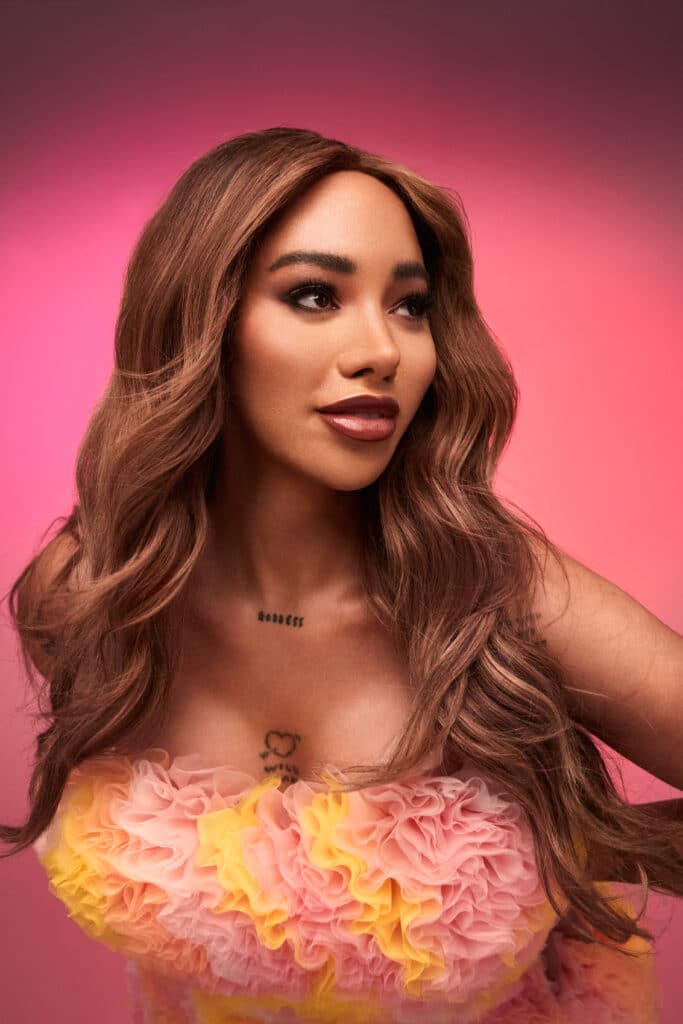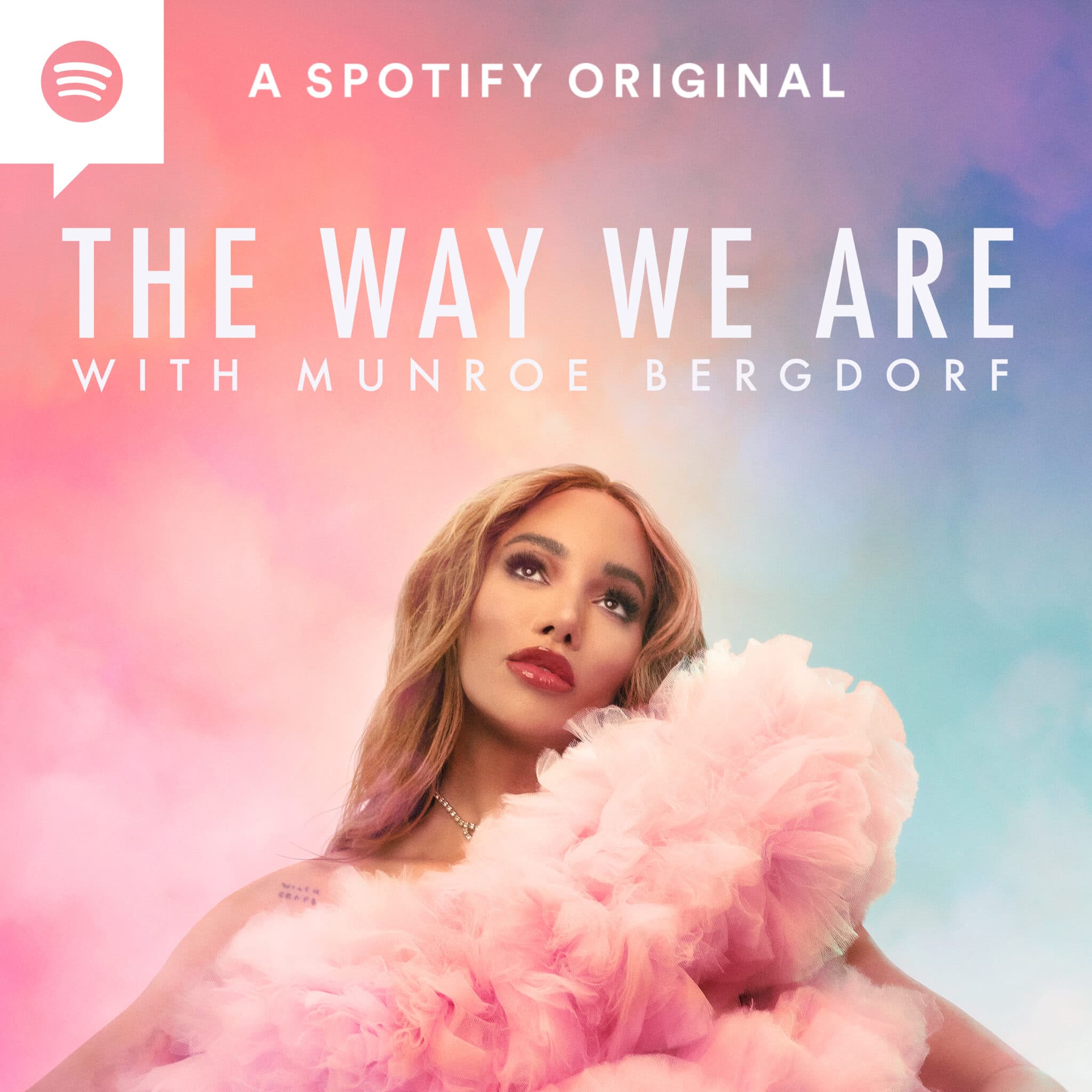Munroe Bergdorf thinks it’s vital we ‘find humanity’ in people we disagree with – even Tories

Munroe Bergdorf’s new podcast, a Spotify exclusive, is called ‘The Way We Are’. (Supplied/Spotify)
Munroe Bergdorf is probably the most famous trans person in the UK.
A role model and advocate, especially for young trans people – Munroe Bergdorf has a “Protect Trans Kids” tattoo and is a patron of trans kids charity Mermaids – the 33-year-old has worked with major beauty brands, walked fashion weeks, and blazed a trail for trans people in the public eye.
It has at times been a rocky road for the model, activist and author – pilloried by the right-wing media for standing up for trans rights, subjected to politicians sharing racist and transphobic abuse about them for supporting trans kids, and abused so much on Twitter that she left the social media platform last year.
Despite it all, they are determined that we all “start looking at each other as human beings that have layers”, and realise “that we don’t always need to get everything right”. This extends to the Tories: “I’m trying to find the humanity in people who I disagree with,” Munroe explains.
PinkNews caught up with Munroe to talk about her debut podcast, The Way We Are, star signs, social media and growth.
PinkNews: The podcast is all about growth. When did you first become interested in this concept, and what was happening in your life at the time?
Munroe Bergdorf: When I first started navigating life in the public eye, I became very aware of how we don’t really hold space for people to change their mind or develop their character or change their worldview or evolve.

Munroe Bergdorf became interested in how people grow when she was first in the public eye. (Supplied/Spotify)
It was around the time when a lot of people in the public eye’s old tweets were coming out, from when they were like, 16, or 12. And we were measuring the adult up to the child. It really bothered me, because of course a 30-year-old is not going to be the same person that they were in their early twenties.
And we don’t take into consideration what was going on with that person at that time. We just take a small tweet, which is – actually I don’t know how many characters it is, because I don’t use Twitter anymore – but it is a limited amount of characters, and we build an identity around that very two-dimensional entity. That’s such a depressing space for us to be in as a society, to not be allowing the complexity and the depth of what is going on in somebody’s life for them to be getting things wrong like that.
When you say you were becoming more visible in the public eye, what year are we talking about?
I guess, 2017? It wasn’t just a ‘me thing’, it was an ‘everybody’ thing. I was seeing it happen to more and more people.
When I said some stupid stuff on Twitter, I was beginning my transition, I was heavily traumatised, I didn’t like myself, let alone a lot of other people. So, to measure myself up against that and say that that’s who I am now, it’s a shame because we lose people’s journeys, we lose the lessons in who people are and how they got to that point.
Because the reality is that we’ve all said stupid stuff in our lifetime, we’ve all gone on a journey to evolving into who we are today. I personally have changed my mind on a thousand things, like the way that I viewed feminism in my early twenties was awful, because I hadn’t gained access to a version of feminism that I could see myself in. I didn’t see it how I see it now.
So I want to have conversations about how people evolve, how they see themselves, and how they navigate the world that they live in.

Munroe Bergdorf’s debut podcast is now available on Spotify. (Supplied/Spotify)
In the first episode, your guest is Mabel. I’m obsessed with how you ask her pronouns and star sign to kick things off. You’re a Virgo, like Beyoncé, and your pronouns are she and they, right?
Right! And yes, I’m a Virgo, the same as Beyoncé and Marsha P. Johnson.
Amazing. How do you feel about being a Virgo – are there any Virgo traits that Munroe Bergdorf particularly identifies with?
I love being a Virgo. But I often think, if I wasn’t a Virgo would I love being a Virgo? Sometimes we’re a little much. Virgos are a very strong energy, and it can be very, very intense. Throughout my life it’s been difficult to try to harness that into a cohesive power. I’m stepping into a space where I’m working with myself instead of against myself, and there has always been quite a lot of inner turmoil.
I don’t take direction very well from people. I take critique well, as long as it’s the critique that I deem productive. I think as I’ve gotten older, I’ve mellowed out a lot. But I think growing up as a Virgo has been a bit of a trip.
https://www.instagram.com/p/CTxVrQrLynk/
The first episode was very nuanced and very deep, and you really get a sense of people’s values through that. What impact do you hope the podcast will have on the people who listen to it?
I just want us to stop seeing each other as two-dimensional avatars, and actually start looking at each other as human beings that have layers, and that we don’t always need to get everything right. It’s so depressing to live in this time where we put so much pressure on each other and also avoid accountability ourselves by doing that.
A lot of the time, we’re pointing fingers at other people to absolve ourselves from the work that it takes to actually improve ourselves. That’s something I had to get better as well, the example that I often give is how I often find myself dehumanising Tories, because so much of what they do with regards to policy, I find inhumane. So I would then often find myself talking about people who ultimately I don’t know – who have kids, who have families – I find myself talking about them as if they’re an idea, rather than a person.
I’m trying to find the humanity in people who I disagree with, as well, and stop trying to play into this harmful narrative, which, at the end of the day is all exactly the same thing and just in a different guise. It’s about how we talk to each other, trying to get people to think a little deeper. There’s always a reason behind why people do the things that they do, there’s a reason why we are the way that we are. That’s the general crux of it.
We’ve all got a past, we’ve all got a future and the present is an amalgamation of both – it’s our hope for the future and the echoes of our past.
This interview has been edited for clarity and length.

